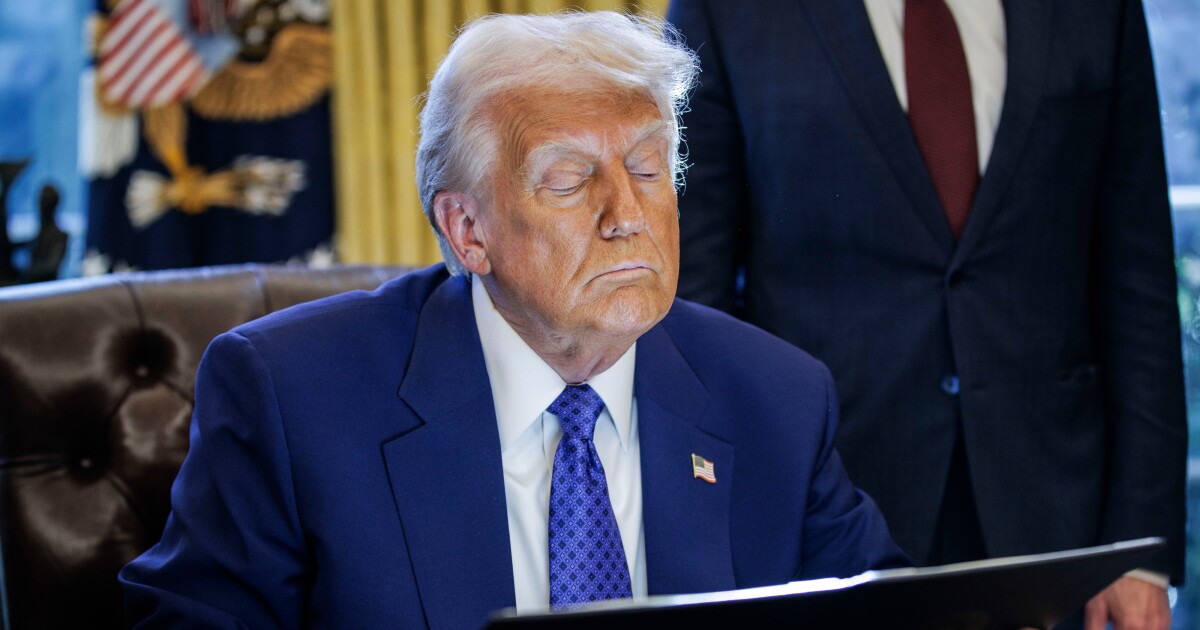President Donald Trump signed an executive order undertaking a massive regulatory review in a bid to fulfill his campaign pledge of eliminating rules he says stifle businesses and innovation.
The order requires all agencies to review all regulations to ensure they align with the administration’s policies and billionaire Elon Musk’s DOGE effort, which seeks to slash federal spending and personnel, according to a White House fact sheet.
DOGE and the White House’s Office of Management and Budget will develop a regulatory agenda to rescind or scale back rules that don’t align with Trump’s vision, the fact sheet said. The order calls on agencies to not prioritize enforcement actions that “stretch statutory authority or exceed the constitutional powers of the Federal Government,” the document said.
The directive gives more power to the cost-cutting efforts overseen by Musk even as the initiative faces legal questions about its authority and scope.
Trump also signed a directive eliminating or minimizing a dozen federal entities as he looks to slash government spending and programs.
The Community Bank Advisory Council and Credit Union Advisory Council would shutter within two weeks, as would other federal advisory councils on long COVID, health equity, and voluntary foreign aid.
The U.S. Institute of Peace, U.S. African Development Foundation, Inter-American Foundation, and the Presidio Trust in San Francisco, would be cut “to the minimum presence and function required by law.”
The order is intended to “further decrease the size of the Federal Government to enhance accountability, reduce waste, and promote innovation,” according to a White House fact sheet. The goal is to reduce the federal bureaucracy to the “minimum level of activity,” the document said.
A fact sheet outlining the rationale for cuts also specified the political affiliations of some involved with the agencies. It faulted the Presidio Trust as a “pet project” of former Democratic House Speaker Nancy Pelosi, and board members who manage the area in her California district for donating to her political campaigns. It also said political contributions from staff employed by the U.S. Institute for Peace skewed toward Democrats over Republicans.
Other agencies and councils slated to be shuttered included the Presidential Management Fellows Program and the Academic Research Council, which provides information to the Consumer Financial Protection Bureau — an agency that has been targeted for recent cuts. Trump in a speech on Wednesday said he has “virtually shut down” the CFPB.
The order calls for an additional list of “unnecessary government entities and federal advisory committees” to be submitted within 30 days to Trump for termination.
Musk’s DOGE effort has sought to shrink the U.S. government, including by dismissing some employees and seeking to encourage others to take buyout packages. About 75,000 workers signed up for a voluntary resignation program, but that tally — which comprises about 3% of the 2.4 million civilian federal workforce — fell short of a goal White House Press Secretary Karoline Leavitt previously set at 5% to 10%, raising the prospect of mass firings.
Trump is already moving to make deeper reductions to the workforce, signing an executive order directing agency chiefs to prepare for “large-scale reductions in force.”
The president’s assault on the federal government has drawn court challenges over DOGE’s powers, and its access to sensitive data on the American public. It has also sparked worries about conflicts of interest involving Musk, the world’s richest person.
A federal judge on Tuesday denied a request to temporarily block DOGE teams from accessing internal government systems and prevent them from removing employees from U.S. agencies, handing Trump and Musk a win as they continue their efforts.
It is unclear how much DOGE’s cost-cutting work will actually save and how those potential savings will be redirected. DOGE’s own accounting has raised questions about its reliability. Trump on Wednesday suggested some savings could be returned to taxpayers or used to reduce the U.S. deficit.


 Economics1 week ago
Economics1 week ago
 Economics1 week ago
Economics1 week ago
 Economics6 days ago
Economics6 days ago
 Finance1 week ago
Finance1 week ago
 Economics1 week ago
Economics1 week ago
 Blog Post6 days ago
Blog Post6 days ago
 Personal Finance6 days ago
Personal Finance6 days ago
 Finance6 days ago
Finance6 days ago












